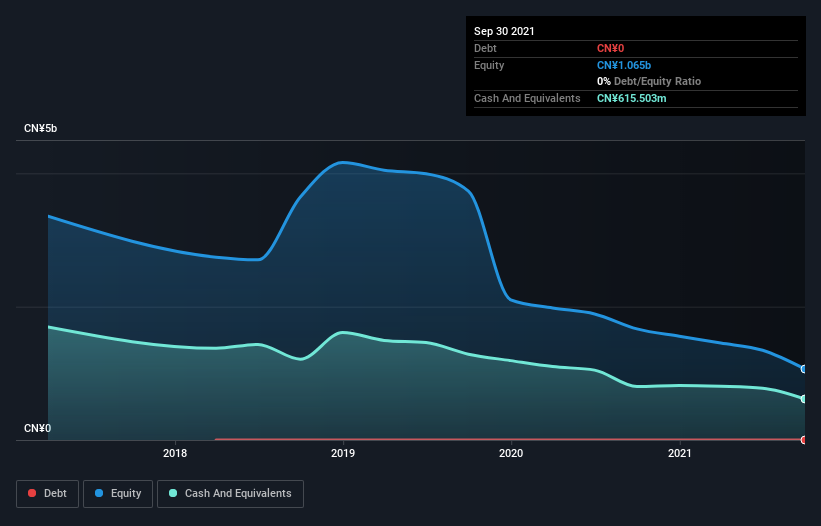Will MOGU (NYSE:MOGU) Spend Its Cash Wisely?
Just because a business does not make any money, does not mean that the stock will go down. For example, although Amazon.com made losses for many years after listing, if you had bought and held the shares since 1999, you would have made a fortune. Having said that, unprofitable companies are risky because they could potentially burn through all their cash and become distressed.
Given this risk, we thought we'd take a look at whether MOGU (NYSE:MOGU) shareholders should be worried about its cash burn. For the purpose of this article, we'll define cash burn as the amount of cash the company is spending each year to fund its growth (also called its negative free cash flow). First, we'll determine its cash runway by comparing its cash burn with its cash reserves.
Check out our latest analysis for MOGU
When Might MOGU Run Out Of Money?
A cash runway is defined as the length of time it would take a company to run out of money if it kept spending at its current rate of cash burn. In September 2021, MOGU had CN¥616m in cash, and was debt-free. Looking at the last year, the company burnt through CN¥277m. So it had a cash runway of about 2.2 years from September 2021. That's decent, giving the company a couple years to develop its business. You can see how its cash balance has changed over time in the image below.

How Well Is MOGU Growing?
MOGU reduced its cash burn by 6.1% during the last year, which points to some degree of discipline. Unfortunately, however, operating revenue declined by 25% during the period. Taken together, we think these growth metrics are a little worrying. In reality, this article only makes a short study of the company's growth data. This graph of historic earnings and revenue shows how MOGU is building its business over time.
How Easily Can MOGU Raise Cash?
MOGU seems to be in a fairly good position, in terms of cash burn, but we still think it's worthwhile considering how easily it could raise more money if it wanted to. Companies can raise capital through either debt or equity. Many companies end up issuing new shares to fund future growth. By looking at a company's cash burn relative to its market capitalisation, we gain insight on how much shareholders would be diluted if the company needed to raise enough cash to cover another year's cash burn.
Since it has a market capitalisation of CN¥160m, MOGU's CN¥277m in cash burn equates to about 173% of its market value. That suggests the company may have some funding difficulties, and we'd be very wary of the stock.
Is MOGU's Cash Burn A Worry?
On this analysis of MOGU's cash burn, we think its cash runway was reassuring, while its cash burn relative to its market cap has us a bit worried. Looking at the factors mentioned in this short report, we do think that its cash burn is a bit risky, and it does make us slightly nervous about the stock. Readers need to have a sound understanding of business risks before investing in a stock, and we've spotted 2 warning signs for MOGU that potential shareholders should take into account before putting money into a stock.
Of course MOGU may not be the best stock to buy. So you may wish to see this free collection of companies boasting high return on equity, or this list of stocks that insiders are buying.
New: Manage All Your Stock Portfolios in One Place
We've created the ultimate portfolio companion for stock investors, and it's free.
• Connect an unlimited number of Portfolios and see your total in one currency
• Be alerted to new Warning Signs or Risks via email or mobile
• Track the Fair Value of your stocks
Have feedback on this article? Concerned about the content? Get in touch with us directly. Alternatively, email editorial-team (at) simplywallst.com.
This article by Simply Wall St is general in nature. We provide commentary based on historical data and analyst forecasts only using an unbiased methodology and our articles are not intended to be financial advice. It does not constitute a recommendation to buy or sell any stock, and does not take account of your objectives, or your financial situation. We aim to bring you long-term focused analysis driven by fundamental data. Note that our analysis may not factor in the latest price-sensitive company announcements or qualitative material. Simply Wall St has no position in any stocks mentioned.
About NYSE:MOGU
MOGU
Through its subsidiaries, operates an online fashion and lifestyle platform in the People’s Republic of China.
Flawless balance sheet with very low risk.
Market Insights
Community Narratives



